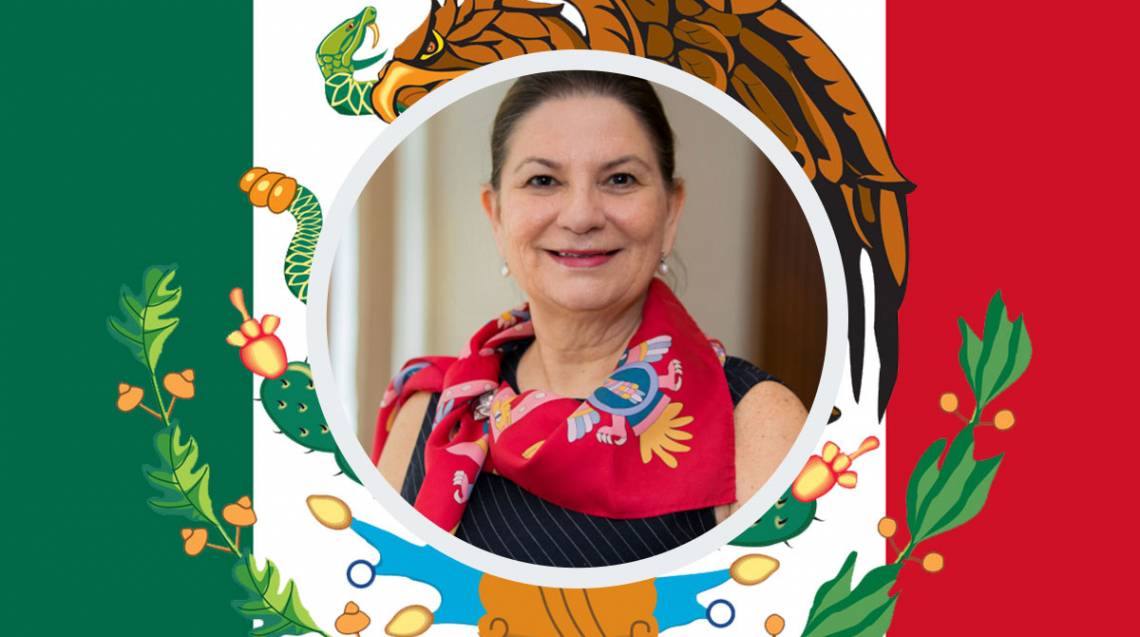The Complexity, the Challenges, and the Uniqueness of the U.S./Mexico relationship
A Conversation with Martha Bárcena Coqui, Mexico's Ambassador to the U.S.

As Mexican Ambassador to the U.S., one of Martha Bárcena Coqui’s biggest challenges is to make the American public understand how their own future is directly linked to Mexico and its people.
While Mexico relies on the U.S. for automotive, aerospace, pharmaceutical, and agricultural needs, “many of the essential workers in the U.S.’ agricultural sector, meatpacking industry, and health sector are Mexican — and are undocumented,” she said. “But they are essential… they might have violated U.S. law, but they are entitled to human rights.”
Ambassador Bárcena said the last 30 years have seen the two countries evolve from a status of “distant neighbors” — as defined by Alan Riding, former New York Times correspondent in Mexico — to the more complex one of “essential partners.”
Bárcena joined the Director of the Center for Latin American and Caribbean Studies (CLACS) and retired U.S. Ambassador Patrick Duddy, plus the director of the Duke Center for International and Global Studies (DUCIGS), Giovanni Zanalda, in a conversation about diplomacy and the state of the U.S./Mexico relationship. The webinar was the first event of the new series of conversations with ambassadors that form part of DUCIGS’ Rethinking Diplomacy program.
Bárcena was appointed in December 2018 by Mexico President Andrés Manuel López Obrador, the first woman ever to hold what is considered the most senior and sensitive position for a Mexican diplomat. She led the renegotiations of the North American Free Trade Agreement (NAFTA) — the largest free-trade area in the world — which laid the foundation for the recently signed U.S.-Mexico-Canada Agreement (USMCA).
Bárcena emphasized that she strongly believes in the need to rethink diplomacy: “I always ask my students in the Mexican foreign service: ‘When you listen to the words Mexican; Foreign; Service, which is the most important word of the three?’”—she concluded, as an example of her inspiring principles. “First is ‘Mexican,’ second is ‘Service,’ and the third is ‘Foreign.’ If diplomacy has a future, it is this attitude of service towards the others. Not living in a bubble.”
Here are excerpts from the event:
ON THE CURRENT STATE OF US-MEXICO RELATIONS
Ambassador Martha Bárcena Coqui
“The main challenge that we all have at the embassy and me as an ambassador, how to really make known to the US public in general that Mexico is this essential partner and that it's part of the past of the present and the future of the United States.”
“Since I arrived here, the biggest challenge was the negotiations (…) in June 2019, with the threat of imposing tariffs on Mexico because of migratory issues. Because I am personally convinced that trade and migration issues should never be linked.”
“The surge of racist and xenophobic narratives puts migrants at risk and does not recognize the enormous contribution of the Mexican-American and Mexican community to the U.S. Hence the need to rethink diplomacy “to bring into diplomacy more of the civil society, the students, the workers, everyday persons, farmers.”
ON MEXICAN IMMIGRATION TO THE U.S.
Ambassador Martha Bárcena Coqui
“Migration is the more human aspect of the bilateral relationship.”
“We need to have specific policies for different groups of the community – US citizens of Mexican origins, legal residents (both permanent and those under the H2A program), DACA recipients.” “And then we have the population of undocumented workers.”
“… (W)e work on the premise that while they may have violated U.S. law, they still have human rights including labor rights.”
“Immigration is seen from the U.S. side more sometimes as a national security issue. From the Mexican perspective is more an economic and social phenomenon that is related to the complementarity of labor markets and demographic profiles.”
“In Central America, we will have almost 2 million people with food insecurity. And there is a direct relationship between food insecurity and migration.”
Ambassador Patrick Duddy
“What we see globally, whether it is immigrants from the Middle East and Africa into Europe or refugees from Venezuela into neighboring countries in South America suggests that there is a larger issue on which one would hope that our two countries would productively engage.”
ON TRANSNATIONAL CRIME AND NARCOTICS
Ambassador Martha Bárcena Coqui
“We have done an effort that was not done in the previous years on freezing the money — “follow the money”— freeze the accounts linked to international crime organizations. We didn’t do that at the level we are doing it now. But one thing is to freeze the money and the other is to confiscate the money and the property so that they are not able to get the money and the properties back. We have not reached that level yet. We are working on it.”
“A lot of the crimes that are committed in Mexico are committed with arms that are sold basically in the U.S., particularly in Texas and Arizona.”
ON THE USMCA (UNITED STATES-MEXICO-CANADA AGREEMENT) AND ITS PREDECESSOR, NAFTA
Ambassador Martha Bárcena Coqui
“NAFTA was very much beneficial for the three countries, but there were sectors that were the big winners and sectors that were the big losers. For example, one of the sectors that was a big loser was small and medium farmers (from Mexico) who could not compete with big agro-industry from the U.S.”
“But the main areas that were not included, and that maybe we have to be included in all bilateral trade agreements of the U.S. with other countries to have a level playing field, is labor issues and environmental issues.”
This event was organized by DUCIGS/RDP in partnership with the Duke Center for Latin American and Caribbean Studies (CLACS), and the Duke Program in American Grand Strategy (AGS.) The RDP is supported by a grant from the Josiah Charles Trent Memorial Foundation Endowment Fund.